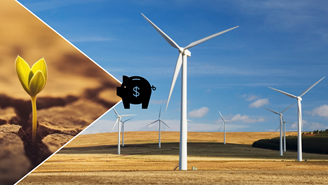President Trump’s announcement last week that he will pull the US out of the Paris Agreement is unlikely to have any meaningful impact on clean energy transition. This is because the global pivot to renewable energy is increasingly being driven by economic fundamentals, not policy (an argument we made in our deep dive of the Paris Agreement in January 2016).
As shown below, the June 1 announcement had negligible impact on two of the market’s most visible clean energy indices: the S&P Global Clean Energy Index and the WilderHill New Energy Global Innovation Index.
Impact of US Withdrawal from Paris Agreement on Global Clean Energy Indices
Source: Sustainalytics, Bloomberg
This is not to suggest that policy is unimportant – incentives clearly make renewable energy more attractive – but it is a reminder that we are rapidly heading towards an environment where solar and wind are price competitive with fossil fuel generation on an unsubsidized basis. In fact, we are already there (gated content – Financial Times).
Thus, with or without US participation in the Paris Agreement, we continue to see a massive upside for investors in the renewable energy theme (the question is where).
There are two other pertinent points about the US withdrawal that bear mentioning. First, cities, educational institutions, companies and investors are free, within their respective areas of influence, to carry on in principle with the Paris Agreement. At last count, nine US states, 128 cities and counties, 185 colleges and universities and 906 businesses and investors representing USD 6.2trn in economic value have joined the “We Are Still In” coalition.
It’s true that joining this coalition is an entirely symbolic commitment, but the sheer size of the group demonstrates extensive latent support for the Paris Agreement among sub-national political actors and businesses across the US.
Second, the US has created a leadership vacuum on climate that looks increasingly likely to be filled by China. Beijing immediately responded to President Trump’s announcement by reaffirming its support for the Paris Agreement and leading, together with the EU, the global energy transition. China spent more than USD 100bn on clean energy in 2015, more than double the US investment, and is home to five of the world’s six largest solar companies. The US may reassert itself as a leader on climate in the future, but in the short run it is likely to lose diplomatic influence in an increasingly important area of multilateral cooperation.
While President Trump has a rationale for abrogating the Agreement it is a decision, in my view, that is plainly out of step with market trends and one that may have negative impacts on US competitiveness and diplomatic power.




